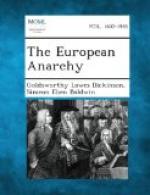and (as I am inclined to suppose) of the Kaiser may
have been that which I have just suggested, there
were other and more important factors to be considered.
It appears almost certain that at some point in the
crisis the control of the situation was taken out
of the hands of the civilians by the military.
The position of the military is not difficult to understand.
They believed, as professional soldiers usually do,
in the “inevitability” of war, and they
had, of course, a professional interest in making war.
Their attitude may be illustrated from a statement
attributed by M. Bourdon to Prince Lichnowsky in 1912[5]:
“The soldiers think about war. It is their
business and their duty. They tell us that the
German army, is in good order, that the Russian army
has not completed its organization, that it would be
a good moment ... but for twenty years they have been
saying the same thing,” The passage is significant.
It shows us exactly what it is we have to dread in
“militarism.” The danger in a military
State is always that when a crisis comes the soldiers
will get control, as they seem to have done on this
occasion. From their point of view there was good
reason. They knew that France and Russia, on
a common understanding, were making enormous military
preparations; they knew that these preparations would
mature by the beginning of 1917; they knew that Germany
would fight then at a less advantage; they believed
she would then have to fight, and they said, “Better
fight now.” The following dispatch of Baron
Beyens, dated July 26th, may probably be taken as
fairly representing their attitude:—
To justify these conclusions I must remind you of the opinion which prevails in the German General Staff, that war with France and Russia is unavoidable and near, an opinion which the Emperor has been induced to share. Such a war, ardently desired by the military and Pangerman party, might be undertaken to-day, as this party think, in circumstances which are extremely favourable to Germany, and which probably will not again present themselves for some time. Germany has finished the strengthening of her army which was decreed by the law of 1912, and, on the other hand, she feels that she cannot carry on indefinitely a race in armaments with Russia and France which would end by her ruin. The Wehrbeitrag has been a disappointment for the Imperial Government, to whom it has demonstrated the limits of the national wealth. Russia has made the mistake of making a display of her strength before having finished her military reorganization. That strength will not be formidable for several years: at the present moment it lacks the railway lines necessary for its deployment. As to France, M. Charles Humbert has revealed her deficiency in guns of large calibre, but apparently it is this arm that will decide the fate of battles. For the rest, England, which during the last two years Germany has been trying, not without some success,




